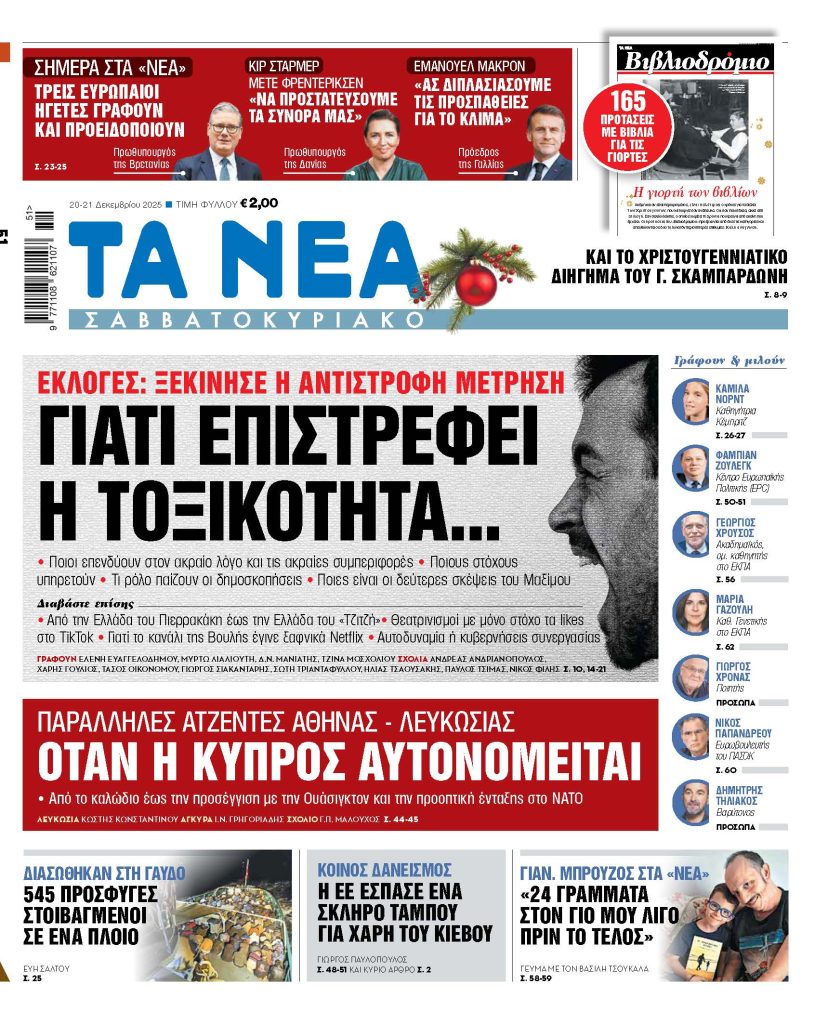by Maria Vasileiou
Greece is heading towards a new phase, at the end of a difficult road. A few years ago you had wished Greeks to have courage, what would you suggest now? The same? Has the country reached the end of a tunnel or is just entering into another tunnel-phase given some strict and unprecedented commitments (high surpluses for a long period etc)?
Now I would first say to the Greek people that you have done an impressive balancing of your public sector – in 2010 your general government primary surplus was minus 10 % of GDP, but now it is plus 4 %. That is indeed an impressive change. Now you are getting some reward for that very difficult adjustment. For example, Greek GDP grew 1,4 % last year in real terms, marking the first year when real GDP growth has exceeded 1% since 2007.
Obviously, the crisis was very severe, so the recovery has taken a long time. Reaching the target is much more difficult than staying at the target. Although Greece is not yet fully out of the woods, the next phase will be clearly less heavy than the previous phase.
Learning from experience, let me refrain from new slogans. I only wish that you maintain the momentum of reforms and turn your hard-won achievements and the economic recovery to the benefit of ordinary Greeks.
Having deep knowledge of the first years of the Greek crisis, but also in light of the agreements reached on June 21st, how do you see Greece’s post-program future? Should there be concerns over its debt sustainability, over the effort towards fiscal consolidation? Are there any concerns?
First of all, the structure of the Greek economy has improved during the programs. However, it is still important to continue implementing structural reforms. For example, the pension system is still one of the most expensive in Europe, which has to be financed, and thus increases the working people’s tax burden, directly and indirectly.
Despite significant progress, the Greek public debt is still high. On the positive side, the debt service costs have been significantly moderated. To enhance the debt sustainability of Greece, the European Commission proposed the extension of maturities and the reduction of interest rate of EFSF/ESM loans already in 2010-12. Some of these measures were accepted then, some only recently. Better late than never.
Now, the June 21st agreement provides Greece more time to implement the necessary reforms and get the economy back on track to be able to pay down the debt. In addition, the Eurogroup will review in 2032 whether additional debt measures are needed.
As the Commissioner at the start of this difficult journey do you see now August 20th marking the end of the austerity years and the beginning of more people friendly policies?
The exit from the program on August 20th was a major turning point. The ongoing economic recovery should help ordinary Greeks’ living conditions. As far as I can read the divs, there is no need for further fiscal tightening in Greece. Given that the government is currently above its primary surplus target, this has even left some small fiscal space.
However, the tax burden on the middle class is currently very heavy – I am very concerned about that. It is a continuous challenge to make the tax system more growth friendly. And in any case, all euro area Member States need to be committed to sound and responsible fiscal policies.
It took Greece eight years to exit the program. Why did it take so long? What mistakes were made? What could have been done differently?
The general government balance was strongly negative for 30 years prior to the crisis in Greece (the average was about -7% of GDP). Moreover, the statistics on the general government finances were distorted, before the crisis, until 2011. The fiscal deficit of 2009 was 15.6 % instead of below 3 %. So, the imbalance in the public finances was both huge and unexpected, which led to a severe crisis. Moreover, structural reforms take a very long time to implement and also the benefits of these reforms come with a significant lag.
Not least because of the statistical falsification, virtually everybody underestimated the depth of the crisis at the outset, both in Greece and in the EU. It took too long to convince policymakers to act, while more rapid action to stabilise the situation would have been less damaging and less costly for everybody. Also, the EU wide crisis management mechanisms were underdeveloped. Now we have the ESM, the SSM and the resolution mechanism for banks.
Have you seen things developing the way you had envisaged eight years ago? If you go back in time, do you think Greece should have been supported in a different way?
Many of us – me included – underestimated the entrenched resistance to economic reforms that can open up the formidable entrepreneurial dynamism and human creativity of Greece. Already the first program 2010-11 had a stronger focus on growth-enhancing reforms than “only” fiscal consolidation, but there was not enough national unity for them.
Regarding the situation of the banking sector in Greece, there is still a sizable legacy of non-performing loans, while commitments to reduce them are quite high. At the same time the country lost its the “waiver”. How do you see the situation?
During the ongoing program to strengthen the Greek banking system, Greek banks have made clear progress in improving their capital and liquidity position. Banks’ deposits have been growing, banks have broadened their market financing and successfully shifted parts of their financing from monetary policy operations onto the interbank repo market. So, the lifting of the waiver was a “non-event” for banks.
However, there’ s still some work to be done to enhance the quality of Greek banks’ capital, which is lower than elsewhere in Europe, consisting partly of deferred tax assets. In addition, there is still a large amount of non-performing exposures (NPE) as a legacy of the crisis. The performance of Greek banks has so far been broadly in line with their approved NPL targets, but continued efforts are needed to further reduce the NPE ratio. Swift progress in resolving NPEs would further increase the capital adequacy of Greek banks and make their market financing less vulnerable to changes in investor sentiment.
Within a broader framework, taking into consideration that clouds are mounting over the world economy, there is the Brexit uncertainty, the crisis in Turkey, fears over Italy. All can hinder foreign investment decisions as well as market behavior. What are your concerns?
The world economy is still growing rather well. Although euro area growth is foreseen to normalize over the coming years, it is expected to remain relatively strong. But there is much political uncertainty.
Possible escalation of trade wars is a downside risk for the economic outlook. Although the direct impact of the recently imposed trade measures israther limited, the impacts of trade disputes via the confidence and investment channel may become significant. The most severe tensions exist between the United States and China, while Europe is building bridges with both of them to avoid a damaging trade war. Also, it is important to find a functional agreement in the negotiations between the EU and the UK.
Moreover, the developments in some emerging economies are worrying. U.S. monetary policy normalization has revealed internal vulnerabilities in some of these countries. At least yet, we haven’t seen any significant contagion, but I recognize that there is still a risk that we may see increased volatility in the emerging markets.
In the euro area, all Member States should continue to follow responsible fiscal policies to avoid financial market shocks. It is always good to have shock-absorbers when you face bumps on the road.
The reform of the EMU is underway, yet at a slow pace. What reforms you think need to move ahead? Over the years, since you were Commissioner, has Europe and the euro become crisis-proof?
EMU is still unfinished business. And crises have a nasty habit to re-appear in the world economy, in one form or another. The key lesson from the financial crisis is that prevention is always better than correction. That calls for pre-emptive rules and action to ensure financial stability, of the kind that have been introduced in the EU and elsewhere.
Completing the Banking Union is indeed crucial for the stability of the European banking system, and therefore a necessary priority in the euro area.
Crisis is always a challenge and no one can ever be fully ”crisis-proof”, but we do have today much better instruments to deal with future crises than before. The European Stability Mechanism is a sturdy financial safety net against market turbulence. The Single Supervisory Mechanism and the Single Resolution Mechanism have been established. Euro area banks are better capitalized than before the crisis.
At the same time the ECB has introduced a set of unconventional monetary policy measures to overcome the problem of the zero lower bound for interest rates and so to enhance monetary policy transmission.
Overall, financial stability of the euro area has improved. But there is no room for complacency, so we’d better make the foundation of the EMU even stronger, for the sake of the real economy, to enable sustainable growth and job creation.




